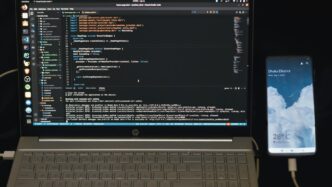So, you want to get better at coding? That’s awesome. There are tons of jobs out there needing people who can write code, like software developers and data scientists. But learning to code isn’t like watching a movie; you actually have to do it. Luckily, there are a bunch of websites that make practicing coding pretty straightforward. These coding practice websites are great for anyone, whether you’re just starting or you’ve been at it for a while. They offer challenges and problems that help you get the hang of things.
Key Takeaways
- GeeksforGeeks offers a huge number of practice problems and learning materials for all skill levels.
- HackerRank is known for its skill assessments and real-world projects, good for interview prep.
- TopCoder hosts regular competitions, including weekly matches, to test your coding speed and problem-solving.
- CodeChef provides monthly contests and a supportive community, great for beginners and students.
- LeetCode is a popular choice for practicing coding problems specifically for technical interviews.
1. GeeksforGeeks
GeeksforGeeks is a pretty solid place to go if you want to get better at coding. It’s been around for a while and has a ton of stuff, like articles, tutorials, and practice problems. Seriously, if you’re trying to learn a new concept or just need to drill some algorithms, they probably have something for you.
They’ve got a huge library of coding problems, broken down by topic and how hard they are. This is super helpful because you can focus on what you need to work on. Plus, they have different kinds of contests, from weekly ones to bigger monthly events, which is great for getting a feel for competitive programming. They even have these ‘Job-A-Thon’ events where you can solve problems and potentially get job offers from companies. It’s not just about solving problems, though; they also have resources for interview prep, which is a big deal for anyone looking to land a tech job.
What’s cool is that it feels like a community. You can learn, practice, and even compete with other developers. It’s a good mix of learning resources and practical challenges, making it a go-to spot for coders at pretty much any level.
2. HackerRank
HackerRank is a pretty solid place to test your coding chops, especially if you’re aiming for a job in tech. They’ve got a ton of challenges across different programming languages like C, Java, and Python, covering everything from basic algorithms to more complex stuff like AI and machine learning. It’s not just about solving random problems, though. They have specific "Interview Prep Kits" that are designed to mimic the kinds of questions you’ll see in actual technical interviews. Plus, they offer skill assessments that can earn you badges and certifications, which is a nice little addition to your resume.
What sets HackerRank apart is its focus on practical application. You can find challenges that are based on real-world projects, giving you a taste of how coding is used outside of a purely academic setting. They also host monthly competitions, which are great for staying sharp and seeing how you stack up against other developers. It’s a good mix of learning, practicing, and competing.
Here’s a quick look at what they offer:
- Monthly Competitions: Keep your skills honed with regular algorithmic and data structure challenges.
- Interview Prep Kits: Targeted practice for common technical interview questions.
- Real-world Projects: Tackle problems that mirror actual industry scenarios.
- Skill Assessments: Get certified and showcase your abilities with badges.
3. TopCoder
TopCoder is a pretty old-school name in the competitive programming scene. It’s been around for ages, and it’s known for its serious contests. If you’re looking to really test your mettle against some of the best coders out there, this is a place to check out.
They run these things called Single Round Matches, or SRMs, pretty regularly. Think of them as timed challenges where you gotta solve algorithmic problems as fast as you can. It’s not just about getting the right answer, but also about how quickly you can get it. They also have Marathon Matches, which are longer, more involved contests focused on optimization problems. These can go on for days, and they’re a whole different kind of beast.
TopCoder also has different tracks beyond just pure competitive programming, like Design and Data Science challenges. So, depending on what you’re into, there might be something for you.
Here’s a quick rundown of what they offer:
- Single Round Matches (SRMs): Weekly timed algorithmic challenges.
- Marathon Matches: Longer contests focused on optimization.
- Data Science Challenges: Competitions for machine learning and data analysis.
- TopCoder Open (TCO): Their big annual tournament for top performers.
4. CodeChef

CodeChef is a pretty popular spot for coders, especially if you like a bit of competition. They host monthly coding contests, which is a big draw. It’s a good place to start if you’re a beginner or an engineering student looking to get more practice. You can learn and practice a ton of stuff here. They have these things called:
- Long Challenge: This one goes on for 10 days and has a bunch of different problems.
- Cook-Off: A shorter, monthly contest.
- Lunchtime: This one is geared towards school students but anyone can join.
Beyond the contests, they also have tutorials and a forum where people talk about problems and solutions. It’s a solid platform for building your coding chops through regular challenges.
5. LeetCode
Alright, let’s talk about LeetCode. If you’re prepping for tech interviews, this is probably one of the first places you’ll hear about, and for good reason. It’s basically a massive collection of coding problems, and they’re pretty much designed to mimic what you might see in a real interview at a big tech company.
LeetCode is a go-to for interview preparation, offering a huge problem set that covers common data structures and algorithms. They host weekly and bi-weekly contests, which are a great way to test your skills under pressure. It’s not just about solving problems though; the platform has active discussion forums where people share solutions and explanations. This community aspect can be super helpful when you get stuck on a tricky problem.
Here’s a quick look at what makes LeetCode stand out:
- Interview Focus: Problems are often categorized by the companies that tend to ask them, giving you a feel for specific interview styles.
- Contest Variety: Regular contests keep things fresh and competitive, pushing you to solve problems faster and more efficiently.
- Problem Breadth: You’ll find problems covering everything from basic arrays and strings to more complex topics like dynamic programming and graph theory.
- Community Solutions: Seeing how others approach a problem can really open your eyes to different ways of thinking.
It can feel a bit daunting at first, especially if you’re new to competitive programming or interview prep, but sticking with it really pays off. You can filter problems by difficulty, topic, and even company, which helps you tailor your practice.
6. Codewars
Codewars is a bit different from some of the other sites out there. Instead of just standard contests, it focuses on what they call ‘kata’ – basically, coding challenges created by the community. You pick a language you’re comfortable with, or one you want to get better at, and start solving these problems. The real draw here is the community aspect. You solve a kata, and then you get to see how other people solved it, which can be super insightful. It’s a great way to learn different approaches to the same problem.
Here’s a quick look at what makes Codewars tick:
- Kata: These are the core coding challenges. They range in difficulty, so you can start with something simple and work your way up.
- Ranking System: As you complete kata, you earn honor points and level up. It gives you a sense of progression, which is pretty motivating.
- Community Solutions: After you solve a kata, you can view and vote on other users’ solutions. This is where a lot of the learning happens, seeing clever tricks or more efficient ways to code.
- Create Your Own Kata: If you’re feeling adventurous, you can even create and submit your own challenges for others to solve.
It’s a solid platform if you enjoy learning by doing and seeing how others tackle problems. Plus, the gamified ranking system keeps things interesting.
7. CodinGame
Ever thought coding could be fun? CodinGame makes it happen. This platform turns learning and practicing code into a game. You can jump into coding challenges that feel more like playing a game, which is a pretty neat way to get better at programming. They support a bunch of languages, over 25 in fact, so you’re likely to find your favorite or learn a new one.
CodinGame offers a few ways to test your skills:
- Multiplayer Competitions: Go head-to-head with other coders in real-time. It’s a good way to see how you stack up under pressure.
- Solo Puzzles: If you prefer to work at your own speed, these puzzles let you focus on problem-solving without the rush.
- Competitions: These are structured events where you can really challenge yourself and see how your skills compare on a global scale.
The biggest draw here is the gamified approach to coding practice. It’s less about dry algorithms and more about applying them in engaging scenarios. Just a heads-up, some users mention the timers can be a bit tricky to spot, so keep an eye on those if you’re in a timed challenge.
8. Coderbyte
Coderbyte is a platform that offers a good mix of challenges and interview preparation tools. It’s got a decent number of coding challenges, often with a focus on real-world scenarios, which is pretty neat. They also have a section dedicated to interview prep, which can be super helpful if you’re looking to land a job in tech.
One thing to note is that the interface can feel a bit busy at first. It might take a little while to get used to where everything is. But once you’re in, you’ll find:
- A variety of challenges: These range in difficulty and cover different programming concepts.
- Interview prep kits: These are designed to mimic actual technical interviews.
- A community aspect: You can see solutions from other users, which is a good way to learn different approaches.
It’s a solid choice for developers who want to practice specific skills needed for job interviews. While it might not be the flashiest site out there, the practical focus makes it a useful tool in your coding practice arsenal.
9. Edabit
Edabit is a pretty neat place to get your coding practice in, especially if you’re just starting out or want to keep things simple. They’ve got over 10,000 interactive challenges, which sounds like a lot, and it’s all free. What’s cool is that they have these beginner tutorials, so you’re not just thrown into the deep end. The challenges are sorted by how hard they are, so you can easily see where you stand.
One of the best things about Edabit is that it has a built-in code editor. This means you can write and test your code right there on the site without needing to open up another program. It makes the whole process smoother.
However, it’s not all perfect. You won’t get any certificates when you finish their courses, which might be a bummer if you like having proof of completion. Also, some folks have mentioned that the programming languages they use can feel a bit old-fashioned sometimes. Still, for straightforward practice and learning the basics, Edabit is a solid choice.
10. Pluralsight

Pluralsight is a solid choice if you’re looking for a place to really learn coding skills at your own speed. It’s not just about solving puzzles; it’s more about structured learning paths. You can get pretty good at languages like Python, JavaScript, and the web basics like HTML and CSS. The site even tries to give you suggestions on what to learn next based on what you’re already doing, which is kind of neat.
What’s good about it:
- You can tailor your learning experience. They have features that let you adjust your training, and it supports different languages.
- It offers a lot of courses on various tech topics, not just basic coding.
- The platform is designed for self-paced learning, so no pressure to keep up with a class.
What could be better:
- You don’t get to interact much with the people who made the courses. This means getting feedback on your work can be tough.
- It’s more of a learning platform than a place for competitive coding challenges.
Keep Practicing, Keep Growing
So, you’ve seen a bunch of places to get your code on. Whether you’re just starting out or you’ve been coding for a while, these sites are the real deal for getting better. Remember, coding isn’t something you just read about; you’ve got to actually do it. Pick one or two that look good to you and start solving some problems. The more you code, the more you’ll figure things out, and that’s how you really build those skills. Don’t be afraid to try new challenges or even join a contest. It’s all part of the journey to becoming a solid developer.
Frequently Asked Questions
Why is practicing coding important?
Just like practicing a sport makes you better, practicing coding helps you get good at it. It’s like training for a game. The more you code, the faster and better you become at solving problems and writing instructions for computers.
Are these websites good for beginners?
Yes, many of these sites are great for people just starting out. They have easy problems and guides to help you learn the basics of coding without getting too confused.
Do I need to pay to use these websites?
Some websites offer a lot of free practice and learning tools. Others might have some paid options for more advanced courses or features, but you can usually start learning and practicing for free.
What kind of coding problems will I find?
You’ll find all sorts of problems! Some are like puzzles, others are about making things work in real life, like building websites or apps. They cover different topics like math for computers (algorithms) and how to store information (data structures).
Can I learn different coding languages on these sites?
Absolutely! Most of these platforms support many popular coding languages like Python, Java, and JavaScript. You can pick the language you want to learn or practice.
Will practicing help me get a job as a coder?
Definitely! Many jobs in tech, like being a software developer, need good coding skills. Practicing on these sites helps you get ready for job interviews and shows employers you know your stuff.














